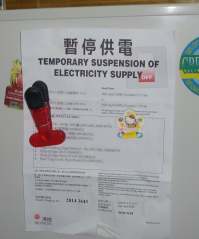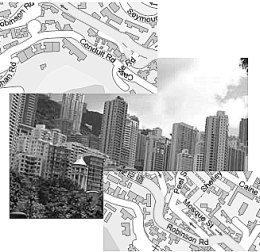8-14 February, 2009
The Big Boss looks happy today, even though life on the top floor of S-Meg Tower is undergoing its biannual slight upheaval as spotty bean-counters from the Accounts Department camp out in the conference room with laptops and lunchboxes, putting together the company’s 2008 financial results. The reason is that he believes reason and fairness are going to prevail, and the Stock Exchange Listings Committee will effectively abandon its proposal to make it harder for Hong Kong’s tycoons to indulge in insider trading.
The small handful of visionaries who single-handedly create all of Hong Kong’s wealth were understandably miffed when at the last minute in late December they realized the full repercussions of the sneaky plan. They would be banned from buying and selling holdings in their own companies from the end of the reporting period until the results announcement – a three-month interlude for many unhurried local firms, and twice a year. Turnover on the stock market would shrivel, they warned, new listings would dwindle, and evil foreigners would take advantage of the blackout to pounce on and ravage the helpless local companies (it didn’t need to be pointed out that leading supporters of this pernicious scheme were Westerners). Innocent women, children and extremely cuddly puppy dogs would suffer horribly. And, most of all, it would be a grave infringement of our local magnates’ human rights.

So the way is clear for a reappraisal of the blackout, which will prompt a second look at quarterly reporting, which will necessitate more consultations on both, which could drag on for a very, very long time. We must face the tragic possibility that there will not be a consensus, without which, as we all know, nothing can ever change. And let us not forget the financial tsunami. As the Government would surely agree, it is essential that we Focus On The Economy, not waste time and energy dealing with silly ideas from impertinent gwailos who don’t understand that Hong Kong is different.
And this is the crux of the matter. At some stage in the last couple of decades, the idea took root that this city was supposed to be run in the interests of its general inhabitants. How anyone could believe such a thing of a place that was originally stolen and founded by and for opium merchants and was being handed over to the world’s biggest Communist dictatorship is a fascinating question. Like the huge black plastic bag of old pizza boxes, polystyrene cartons and empty Coke cans outside the conference room, man’s capacity for self-delusion seems to be bottomless.
A couple of weeks ago, the dutiful Filipino elves placed a circular from Hongkong Electric on the door of my liquid refreshments refrigerator in Perpetual Opulence Mansions, firmly attaching it with not one, but two tasteful magnets. It announced an impending suspension of the power supply in order to dig up the street, upgrade some cable, and chalk up a bit more capital expenditure, which – under the Scheme of Control regulating monopoly utilities – automatically boosts the profit of this part of tycoon Li Ka-shing’s empire. Or “guarantees us reliable supplies of extremely high-quality electricity.” Its presence vaguely registered with me. This happens from time to time. They cut the power from 9-11am or 2-3pm, when most people are at work anyway. In the past, they have always posted the warning at the building entrance, but maybe the Scheme of Control now allows our two vertically integrated power generators to treat individual notices to every household as part of capital expenditure.
Last night, I was in bed sipping a sauvignon blanc and enjoying every map-crazed history buff’s idea of a wild and utterly self-indulgent time – reading How the States Got Their Shapes by Mark Stein. Why does Oklahoma have that panhandle? Why are so many Western states the same size or shape (or how come a few are not)? Why is Maryland such a cartological mess? It’s all here. Just flicking through the index rouses the passions…



An idea suddenly came to mind. An early-hours, alcohol-tinged brainwave. Feeling my way past items of furniture and along walls, I eventually made it to the kitchen. A bit more groping around and I felt the missive on the front of the refrigerator and unprised it from the grip of what this morning I note is a Hello Kitty magnet. Then I crouched down on the floor. “I will open the fridge door,” I was telling myself, “and read it in the light.”
When lateral thinking gets this stupid, it’s time for bed.
Wed, 11 Feb
Following an invitation from Time’s Asian edition to peruse a recent article on a string of killings of prostitutes, I find myself comparing the murder rates between ladies of the night and the rest of the population in Hong Kong. Of 36 murders last year, six were of sex workers. The story gives the number of women working in one-woman brothels as 1,600. If all the slain hookers came from this group it would imply a 266-to-1 chance of being killed.
But perhaps the half-dozen victims came from the entire population of prostitutes, which appears to be somewhere between 20,000 (according to activist group Zi Teng) and 200,000 (the HK Medical Journal, citing a 2000 study). Zi Teng work mainly with resident working girls, so their figure must miss out many who commute back and forth on tourist visas between Hong Kong and their Mainland or Southeast Asian homes. On the other hand, the academics are probably exaggerating (one in every 17 women?) in order to get Government funding or something. So let’s assume the number is 100,000. This would mean that while the average resident of the Big Lychee has a tiny 190,000-to-1 chance of being murdered, prostitutes face odds of 16,700-to-1. This isn’t great, but it’s definitely better than being a plain citizen of Newark, New Jersey, a city of 280,000 (say half the size of Shatin) with 66 murders a year – 4,240-to-1.
But the recent string of three murdered prostitutes, plus a series of four early last year, indicate that the hookers in the one-woman brothels are in fact facing most of the risk, and the 266-1 odds might not be so outlandish. Their workplaces must by law – for all practical purposes – not have any arrangements with guards or indeed the presence of anyone in the apartment apart from the hooker herself. It is legal to exchange sex for money, but any ancillary service activities to do with the business, like marketing, management or security, are criminalized. Most other prostitutes have much safer working environments, to the extent that some of the temptresses in Wanchai bars feel sufficiently confident to poison and rob their clients.
The Time article quotes legislator Margaret Ng as demanding the law be changed. But this Government is incapable of getting anything changed. Whether it is banning parked vehicles from having their engines running, getting schools to teach kids in the only language they comprehend, or stopping tycoons from insider trading, the administration is helpless.

As a new day dawns outside the IFC Mall branch of Pacific Coffee in Exchange Square, wild American friend Odell takes a sip of organic goji berry and celery seed cappuccino and scribbles something in a box on a large application form. “I forget – how many points do I get for having a Thai wife who used to be a domestic helper?”
I sigh with exasperation. “How many times do I have to tell you? You don’t get any. If your wife used to be a maid you lose points!” He nods and mumbles something. “Five, to be precise.”
As I remind him of the points structure for spouses and partners, I find myself amazed at how out of date it all is. You still get 25 points for being hitched to the offspring of a Mainland politician or tycoon, even though there are so many of them around these days. You still get 10 points for being attached to a Cathay Pacific flight attendant, even though the airline now recruits them from Southeast Asian slums at amah rates of pay. And is it really fair, in these modern times, to knock 15 points off if a man’s other half is a former wife of Dickson Poon?
Still, the crux of it is your station in life, and this is where Odell is going to fail in his attempt to take advantage of falling rents and move up in the world from his rat-infested neighbourhood down near Hollywood Road to the rarified altitudes where the beautiful people live, on Robinson or Conduit, above Caine Road. He looks up at me. “I count as a thespian, huh?”
Another sigh – this time a sympathetic one. As Chief Guest Behavior Management Artist at Disneyland, Odell fits squarely into Retail, Catering and Tourism. And this is why he will never be accepted to live up the hill. It’s nothing personal, but there are some people one just doesn’t want as neighbours, and those undoubtedly decent folk who toil in shops, hotels, restaurants and bars – and theme parks – are sadly among them. Even if they can afford it, they just don’t get past the Selection Committee. You might as well turn up at the interview wearing a rugby shirt from a pub. Finance is no problem. Independent income, step right in. Arts, academia, law and journalism all get the welcome mat, despite the sordid lives we know these people lead. It’s when it comes to the more hands-on professions that things get tricky. Engineers, say, or quantity surveyors. They’d feel more at home in Happy Valley, near the HK Football Club, wouldn’t they? Or Discovery Bay? As for someone who serves The Mouse, herding unruly Mainland tourists around with an electric cattle prod…

Fri, 13 Feb
In a shocking affront to Hong Kong’s esteemed captains of industry, the dark forces intent on depriving tycoons of their indisputable right to engage in insider trading have returned with a so-called compromise. Under this proposal, our leading wealth-creators will retain their traditional entitlement to buy and sell stock in their own companies up to one month before releasing interim results, but will face a blackout period of a whole two months up to the publication of the full annual accounts. With many of our noblest conglomerates announcing their results around three to three-and-a-half months after the end of the reporting period, this would force our dynamic titans of enterprise to make the appropriate adjustments to their personal holdings in the first four to six weeks – for example, this year it would have been between 1 January and today. It is possible that their spotty bean counters will still not have given them all the information they need to make wise and profitable decisions. And, being concentrated in a much shorter space of time, any trades could be all the more noticeable to the wider world, with all its impertinence and disrespect for others’ privacy. It is a credit to these gentlemen that they are taking this wanton mutilation of their birthright calmly and stoically, so as not to upset the harmony of our community at this time of economic uncertainty.
On a happier note, a good time was had by all at last night’s birthday party, at which everyone had to wear a beard and say things like, “…and so it was with a full-blooded negro with whom I happened once to be intimate.” The outstanding thing about him, in addition to his obvious achievements, is that he was so ahead of his time that there are still people out there who haven’t caught up.
Although the existing races of man differ in many respects, as in colour, hair, shape of skull, proportions of the body, &c., yet if their whole structure be taken into consideration they are found to resemble each other closely in a multitude of points. Many of these are of so unimportant or of so singular a nature, that it is extremely improbable that they should have been independently acquired by aboriginally distinct species or races. The same remark holds good with equal or greater force with respect to the numerous points of mental similarity between the most distinct races of man. The American aborigines, Negroes and Europeans are as different from each other in mind as any three races that can be named; yet I was incessantly struck, whilst living with the Feugians on board the Beagle, with the many little traits of character, shewing how similar their minds were to ours; and so it was with a full-blooded negro with whom I happened once to be intimate.
He who will read Mr. Tylor's and Sir J. Lubbock's interesting works can hardly fail to be deeply impressed with the close similarity between the men of all races in tastes, dispositions and habits. This is shown by the pleasure which they all take in dancing, rude music, acting, painting, tattooing, and otherwise decorating themselves; in their mutual comprehension of gesture-language, by the same expression in their features, and by the same inarticulate cries, when excited by the same emotions. This similarity, or rather identity, is striking, when contrasted with the different expressions and cries made by distinct species of monkeys. There is good evidence that the art of shooting with bows and arrows has not been handed down from any common progenitor of mankind, yet as Westropp and Nilsson have remarked, the stone arrow-heads, brought from the most distant parts of the world, and manufactured at the most remote periods, are almost identical; and this fact can only be accounted for by the various races having similar inventive or mental powers. The same observation has been made by archaeologists with respect to certain widely-prevalent ornaments, such as zig-zags, &c.; and with respect to various simple beliefs and customs, such as the burying of the dead under megalithic structures. I remember observing in South America, that there, as in so many other parts of the world, men have generally chosen the summits of lofty hills, to throw up piles of stones, either as a record of some remarkable event, or for burying their dead...

stores
Dymocks, IFC Mall
& other HK Dymocks
(some, probably, maybe)
online
Hong Kong & worldwide
USA & worldwide
UK
Canada
Germany
Japan
France